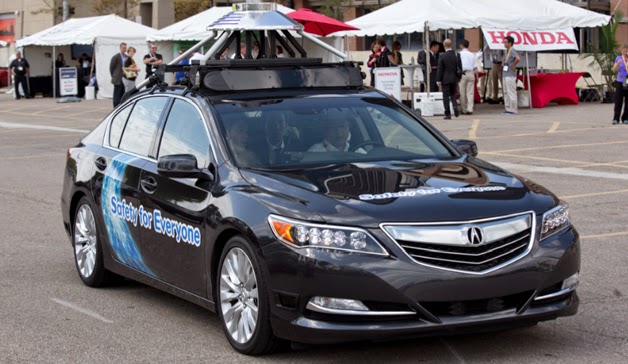Back when investigators from the National Highway Traffic Safety Administration first probed reports of unintended accelerations in Toyota vehicles, they ran into a serious internal roadblock. They lacked the expertise to examine the problem. They suspected a software glitch, but couldn't delve into the interactions between the software and physical linkages in the vehicles because they didn't understand them. NHTSA ultimately needed to call on experts from NASA to study the reports.
"Can you imagine calling up NASA, and saying, 'Can you take a break from putting robots on Mars and come take a look at this Toyota?'" asks Ryan Calo, an assistant professor at the University of Washington School of Law. "That's not a sustainable strategy."
In a white paper released by the Brookings Institute on Monday, Calo argues NHTSA's shortcomings in investigating Toyota are one example of many in which government institutions have struggled to keep pace with rapid technologic advancements across a variety of industries.
To counteract that, he proposes the United States create a Federal Robotics Commission that could make sense of the complex technologic, legal and regulatory questions that have risen around robotics and artificial intelligence.
These challenges are wide in scope, affecting everything from driverless cars to drones to algorithms that control trading in financial markets. So far, federal agencies have addressed challenges on a case-by-case basis. This approach has failed, Calo argues, because information rarely gets shared or built upon between departments. As a result, he says the United States is falling behind other nations that have more pronounced leadership in pushing these issues to the forefront.
"As a consequence of this piecemeal approach, we're not accruing expertise fast enough or developing a coordinated approach," he tells Autoblog. "This doesn't need to be a commission that limits or regulates. But it has expertise, so that there's a body that can calmly and convincingly address these issues."
In US history, there is precedence for the creation of such a commission. The Federal Railroad Administration was created as a means to harness the revolution of cross-country trains and the Federal Radio Commission emerged as a means to the communications revolution that occurred when radios came along.
With the arrival of driverless cars and vehicle-to-vehicle communication, the US is on the cusp of another transportation revolution, and Calo, who has taught robotics law and privacy-policy courses, argues a Federal Robotics Commission could play a key role in shaping policy and addressing the challenges they present.
For example, in 2011, Nevada passed the first law in the nation that aimed to address autonomous vehicles. Initially, the legislature defined autonomous cars as any in which the car substituted for a human operator. In practice, though, this definition was unwieldy. Automotive features such as collision avoidance systems fell under the law, which imposed more stringent oversight on thousands of cars already on the road. The state had to repeal its law and pass a new one with a more precise definition.
"There are a lot of driverless-car questions that a robotics commission could address," Calo said. "How do we know they're good enough to go on highways? Do we have to take a company's word for it? Do they pass a test that the government designs? How do we deal with issues of liability that will arrive, probably on a national scale?"
Questions over liability in the era of autonomous or driverless cars aren't necessarily new ones. But the fact they've gone unanswered for years without much traction toward answers might be reason enough to let an agency like a Federal Robotics Commission take an active role in addressing them.
Subscrever:
Enviar feedback (Atom)
Com tecnologia do Blogger.











0 comentários:
Enviar um comentário